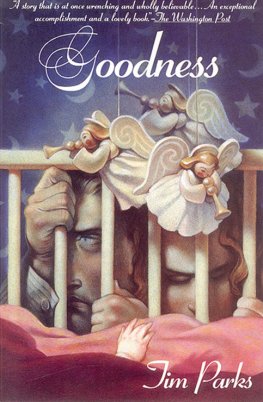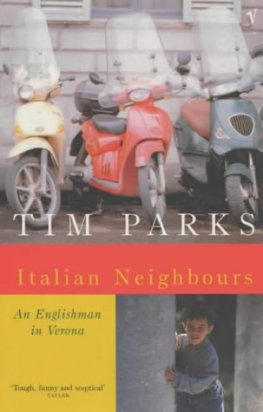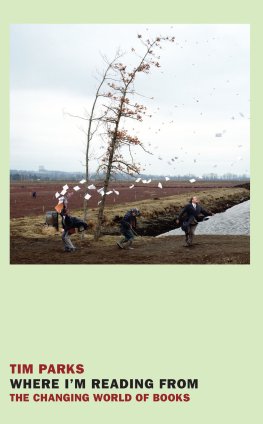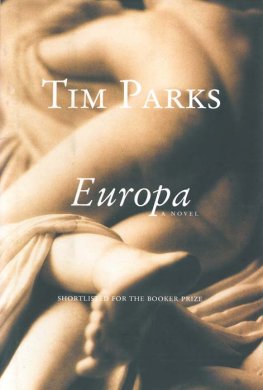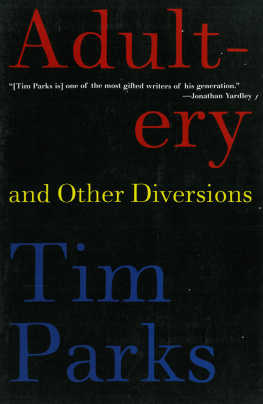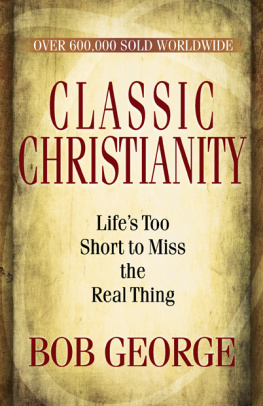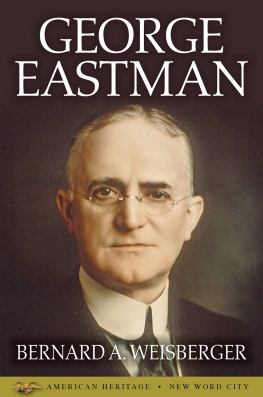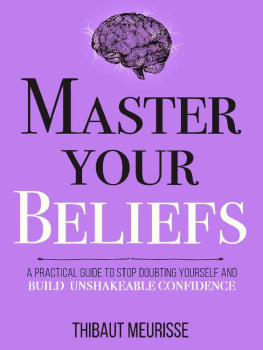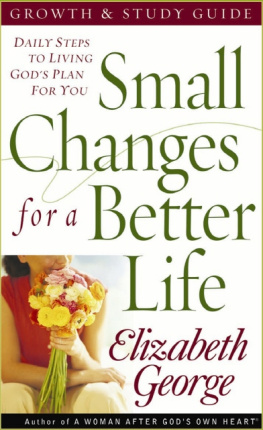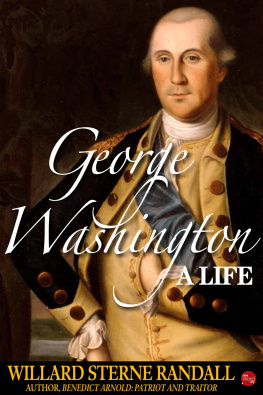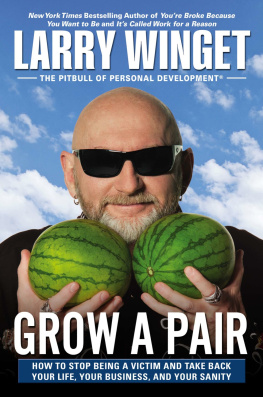Tim Parks - Goodness
Here you can read online Tim Parks - Goodness full text of the book (entire story) in english for free. Download pdf and epub, get meaning, cover and reviews about this ebook. year: 1994, publisher: Grove Press, genre: Prose. Description of the work, (preface) as well as reviews are available. Best literature library LitArk.com created for fans of good reading and offers a wide selection of genres:
Romance novel
Science fiction
Adventure
Detective
Science
History
Home and family
Prose
Art
Politics
Computer
Non-fiction
Religion
Business
Children
Humor
Choose a favorite category and find really read worthwhile books. Enjoy immersion in the world of imagination, feel the emotions of the characters or learn something new for yourself, make an fascinating discovery.
Goodness: summary, description and annotation
We offer to read an annotation, description, summary or preface (depends on what the author of the book "Goodness" wrote himself). If you haven't found the necessary information about the book — write in the comments, we will try to find it.
Goodness — read online for free the complete book (whole text) full work
Below is the text of the book, divided by pages. System saving the place of the last page read, allows you to conveniently read the book "Goodness" online for free, without having to search again every time where you left off. Put a bookmark, and you can go to the page where you finished reading at any time.
Font size:
Interval:
Bookmark:
Tim Parks
Goodness
Prologue
My father was a missionary murdered in Burundi in 1956. It was very much his own fault. He had been warned to leave and by not doing so he risked getting the rest of us killed too. When we were captured in our white mission bungalow, my mother, my sister and I were given the choice of dying with him or of saying some simple formula that renounced our faith, after which we would be allowed to leave the country. I was too young of course either to have a faith or to renounce it, though I dont doubt what my decision would have been. My mother on the other hand was torn. Shes a superstitious woman and believes in the power of words spoken even when not meant, the kind of person who would feel guilty at discovering that the phrase she had innocently repeated in some foreign language was blasphemy. Even today she wonders if she wont be punished for all eternity for having responded to her maternal instinct and saved both herself and us.
Its curious thinking about this now. Presumably a shot rang out and dispatched my father. I dont remember, I was too small. I havent the slightest memory either of him or of Africa. If I think of his martyrdom at all it is with total incomprehension. And if I mention the grotesque affair now it is only because over the years I have come to see it as just the first, the most absurdly emblematic, of a long series of incidents in which other peoples pretensions to goodness were to clash, to my considerable detriment, with the most naked common sense.
Part One. BEFORE HILARY
A Bundle of Unpleasant Contradictions
After my fathers death we came back to England to live with my widowed grandfather and spinster aunt in an ill-conceived semi-detached in Park Royal, about mid way between the Middlesex Hospital and where they later built the A40. My grandfather, who had escaped his country labourer background with a naval career that pulled him up to the dizzy heights of home ownership, lace curtains, embossed wallpaper and the like, was of the opinion that he was doing us a great favour putting a roof over our heads, and having never been able to stomach my fervently evangelical father, adopted a told-you-so attitude that was to weigh heavily on my sister Peggy and myself throughout our childhood, and even more so, one imagines, on my mother who had no money to go elsewhere.
Those jungle boys, the old man would begin, though I dont suppose he could have been much over fifty then, havent got souls to save, have they? He smoked a pipe, as grandfathers will, or used to, and regularly occupied a heavy shapeless armchair in an ungenerous living room choked with green Wedgewood and Hummels. Never saw the point of missionarying, he grunted.
I remember, from where I would be lying on the hearthrug, being fascinated by his facial skin, especially on the cheeks where the pores were so thick and large as to suggest the texture of some old neglected sponge. Certainly they had soaked up enough in their time. His hair was already white and prickly short, the kind old men scratch vigorously. Shifty sods too. He sucked in through his nose. Saw enough of that lot in my time to know to leave well alone, I did.
Naturally he was speaking, even in those early days, over the urgent clamour of the television which he watched fixedly but didnt appear to need to listen to. Unless it was encroaching deafness. He puffed one pipe while scraping the bowl of another. If Arthurd had any sense at all hed have kept a gun in the house. Couple of loud bangs would have had that lot scarpering. Thats what I say.
My mother only said. Please, Dad. Please, and would get up and go into the kitchen. He might shout after her: For Gods sake, Jenny, cant you even take a joke? Or are you going to mourn after him your whole bloody life? She wouldnt answer. She would never answer. This is my mothers way. For my own part, I remember feeling desperately sorry for her, yet incapable of intervening, since I always suspected that Grandfather, incorrigibly unpleasant and offensive as he was, was right. What was the point of missionarying? What possible sense did it make? My father must have been mad to go out there talking to blacks with their bones in their noses, their drums, their funny clothes, when they wore them (we had photographs). It wasnt that I was of an age to hold any progressive beliefs on the equal value of all cultures and religions. Quite the contrary. Just that somehow, from the cradle, I didnt believe in the saving and transformation of souls. My intuition has always been that people are who they are and forever remain so, or at best will simply become more and more themselves, more and more that spirit that you cant help but feel destined to be. Just as it is destiny to be black, destiny to be white. This is what self means, surely. Otherwise who are we?
Only Peggy objected. Only she stood up for Father. She said: You shouldnt say those kinds of things, Grandad. We sat, lay, stood in that smoky suburban sitting room in West London: floral carpet, a pattern of coronation crowns and sceptres on the wallpaper, the grey TV carelessly wrapping and rewrapping time into odd half hours of this and that. Peggy said: Black people have souls just like us. Yes they do. Red and yellow, black and white, all are precious in His sight.
What would she have been, seven, nine? She wore her hair in a ponytail and stood chubbily round-bottomed by Grandfathers chair. She said: Daddy was a good man. He loved the Lord Jesus and he wanted to save people so they wouldnt go to hell. And now he has gone to heaven to wait for us there.
While she spoke of course, my Grandfather would keep mumbling and rumbling his prejudices, since this wasnt really a conversation so much as two people at either end of life speaking their parts in each others presence. Man wouldve done better if hed thought of his own wife and kids before those bloody chimpanzees.
I might catch the sound of my mother crying softly in the kitchen.
God is looking after us, Peggy insisted.
With the help of muggins heres pension I suppose, Grandfather came back. Until eventually he turned from the television to look at her out of sunken brown eyes. Though there was still a glint there. He would have been wearing his pub-going dark waistcoat, shirt-sleeves rolled up; a bulky, heavy-breathing presence.
Staring him out, she said: Dont be such a miserable old grumbler, Grandad. Its sinful to grumble and be miserable.
The sight of her, rather than anything she said, would at last make him forget his racist grouching. Hed say, Come here, Peggy love. Come and sit on Grandads knee.
She pouted. She might well have had her hands on her hips. Probably she was already aware of striking poses. Certainly Grandfather recognised them when they were struck. He liked to grab her and cuddle her hard on his knee and say things like: My jewel, my Peggy. I do like a little girlie with some sparkle about her.
My mother cooked, Grandfather rowed with or cuddled Peggy, and around six thirty Aunt Mavis came back, flopped down in an armchair, kicked off her shoes, treating us to a whiff of feet which nobody commented on, and lit a cigarette. I even remember the brand, Park Drive. They were the first I tried myself, stealing from her handbag. With her and Grandad together and the windows forever closed against the damp, we thus sat out the 1960s in a thick Virginia smog.
Very quietly, to myself and Peggy, when she had us on our own walking to church perhaps, my mother would say: Smoking is evil. Because its an abuse of the body the Lord gave you. It was the nearest she came to criticising Grandfather openly. She said: Our bodies are precious, holy. Every human body, His temple, made in His image. Thats why you must never smoke. You must promise me youll never smoke. I suppose one might have objected that martyrdom was an even greater abuse of this image of Gods we were supposed to be taking care of. But as a boy this never occurred and later there would seem no point in being cruel, since, come eighteen odd, you have learnt to humour rather than rebel. You have already won your freedom. Or at least youre of an age to think in such terms.
Font size:
Interval:
Bookmark:
Similar books «Goodness»
Look at similar books to Goodness. We have selected literature similar in name and meaning in the hope of providing readers with more options to find new, interesting, not yet read works.
Discussion, reviews of the book Goodness and just readers' own opinions. Leave your comments, write what you think about the work, its meaning or the main characters. Specify what exactly you liked and what you didn't like, and why you think so.

